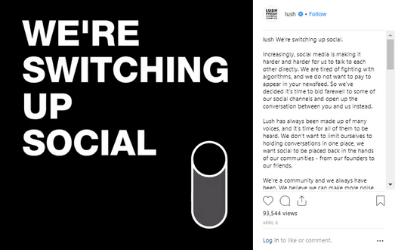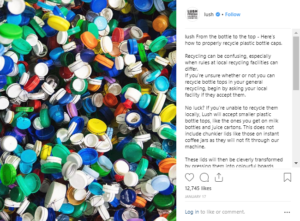On April 8, Lush UK announced that they were disabling their social media platforms, including Facebook, Instagram, and Twitter, in an effort to foster more authentic relationships with their customers. The UK-based company made the announcement in an Instagram caption, expressing that they are “tired of fighting with algorithms,” and feel limited by the type of communication social media demands. Lush USA will maintain their profiles for the time being.
“Lush has always been made up of many voices, and it’s time for all of them to be heard,” the post read. “We want social to be placed back in the hands of our communities. We believe we can make more noise using all of our voices across the globe because when we do we drive change, challenge norms and create a cosmetic revolution. We want social to be more about passions and less about likes.”
However, this isn’t the end of Lush on social. In order to highlight these diverse voices from their audience, the company is instead encouraging use of the hashtag #LushCommunity, which consists entirely of user content and offers an opportunity for community members to engage with one another on their own pages.
This is a bold choice, and one that may only work because of who Lush is as a company. They may have earned social media notoriety due to the “oddly satisfying” (to reference a popular social obsession) nature of their colorful bath-bombs, but this fascination was more consumer-driven than Lush-driven. Historically, Lush is much more concerned about sustainable sourcing and stopping climate change than about curating a social feed that visually dazzles. So paying the increasing prices of Instagram advertising to reach their audience didn’t feel quite right to the brand.
As a company, Lush is very outspoken about their nonprofit partnerships, including animal welfare, human rights and environmental initiatives. Their signature lotion, Charity Pot, goes for $7.95 and 100% of the proceeds (minus taxes) go to one of their philanthropic partners. Direct, authentic communication with their customers has always been a pillar of their business.
Prior to this decision, Lush UK’s social feeds reflected this emphasis on charity, focusing on brand purpose and sustainability rather than gratuitously capitalizing on the Instagrammable-ness of their bright, fizzing merchandise. The Boomerang videos of exploding bath bombs live on their customer’s pages – and under #LushCommunity.
So while disabling social pages may be a shot in the foot for some companies, this is exactly on-brand for Lush. Consumers and staff alike can mingle and share content through the hashtag, and Lush is no longer expected to respond to a litany of expectant DMs or required to spend money better spent on their charitable initiatives on Instagram advertising.
This move comes at a time when the ‘personal-ness’ of social media is a hot topic: on March 6th, Facebook Founder and CEO Mark Zuckerberg expressed in a blog post that the platform will be evolving once again into a more intimate communication device, with privacy at its foundation. According to the CEO, “private messaging, ephemeral stories, and small groups are by far the fastest growing areas of online communication.” It appears the masses are craving niches. Fostering an inclusive Lush community, rather than shouting into the void, may be the most progressive social strategy in the game right now.
We will have to wait and see. As the social media break-up post reads, “This isn’t the end, it’s just the start of something new.”



